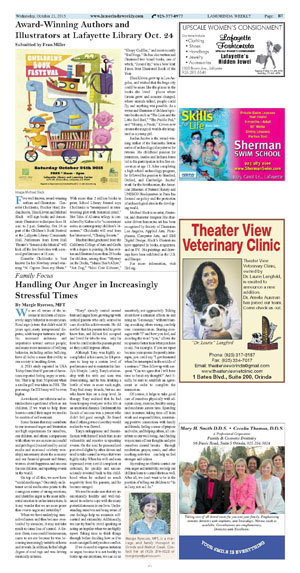|
|
Published October 21st, 2015
|
Family Focus
|
| Handling Our Anger in Increasingly Stressful Times |
| By Margie Ryerson, MFT |
 |
| Margie Ryerson, MFT, is a marriage and family therapist in Orinda and Walnut Creek. Contact her at (925) 376-9323 or margierye@yahoo.com. |
We are all aware of the increase in incidents of excessively angry behavior in recent years. Road rage (a term that didn't exist 30 years ago); nasty interpersonal disputes; adult temper tantrums in public; increased rudeness and impatience toward service people; and many more instances of bullying behavior, including online bullying, have all led to a sense that civility in our society is breaking down.
 A 2013 study reported in USA Today found that 60 percent of Americans reported feeling angry or irritable. That is up from 50 percent when a similar poll was taken in 2011. The percentage for 2015 may well be even higher.
A 2013 study reported in USA Today found that 60 percent of Americans reported feeling angry or irritable. That is up from 50 percent when a similar poll was taken in 2011. The percentage for 2015 may well be even higher.
 As we know, our behavior and attitudes have a profound effect on our children. If we want to help them learn to control their anger we need to be models of self-restraint.
As we know, our behavior and attitudes have a profound effect on our children. If we want to help them learn to control their anger we need to be models of self-restraint.
 Some factors that may contribute to our increased anger and frustration are high expectations for ourselves, our children, and others; comparisons with others we see as more successful and privileged (exacerbated by social media and increased celebrity worship); uncertainty about the economy and our financial present and future; worries about happiness and success for our children; and upsetting events in the world.
Some factors that may contribute to our increased anger and frustration are high expectations for ourselves, our children, and others; comparisons with others we see as more successful and privileged (exacerbated by social media and increased celebrity worship); uncertainty about the economy and our financial present and future; worries about happiness and success for our children; and upsetting events in the world.
 On top of all this, we now have "social media rage." One study on Internet social media sites points to the contagious nature of strong emotions, and identifies anger as the most influential emotion in online interactions. Is it any wonder that we are more prone than ever to anger and irritability?
On top of all this, we now have "social media rage." One study on Internet social media sites points to the contagious nature of strong emotions, and identifies anger as the most influential emotion in online interactions. Is it any wonder that we are more prone than ever to anger and irritability?
 When we have underlying unresolved issues and then become overloaded by stressors, it may not take much to cause loss of control. A former client, a successful businessman, came to see me because he was becoming increasingly irritable at home and at work. In addition, he had a high degree of road rage and was driving erratically at times.
When we have underlying unresolved issues and then become overloaded by stressors, it may not take much to cause loss of control. A former client, a successful businessman, came to see me because he was becoming increasingly irritable at home and at work. In addition, he had a high degree of road rage and was driving erratically at times.
 "Tony" already carried around hurt and anger from growing up with critical parents who only seemed to care about his achievements. He did not feel that his parents tried to get to know him, and did not feel accepted and loved for who he was - only for how he could make his parents proud so they could impress others.
"Tony" already carried around hurt and anger from growing up with critical parents who only seemed to care about his achievements. He did not feel that his parents tried to get to know him, and did not feel accepted and loved for who he was - only for how he could make his parents proud so they could impress others.
 Although Tony was highly accomplished in his career, he felt pressure to keep up a certain level of performance and to maintain his family's lifestyle. Lately, Tony's relationship with his wife and sons was deteriorating, and he was drinking a bottle of wine or more each night. Tony had many friends, but no one who knew him on a deep level. In therapy Tony realized that he had been keeping everyone in his life at an emotional distance. Underneath his facade of success was a person who didn't feel good enough. He feared that if others got too close they would realize he was flawed.
Although Tony was highly accomplished in his career, he felt pressure to keep up a certain level of performance and to maintain his family's lifestyle. Lately, Tony's relationship with his wife and sons was deteriorating, and he was drinking a bottle of wine or more each night. Tony had many friends, but no one who knew him on a deep level. In therapy Tony realized that he had been keeping everyone in his life at an emotional distance. Underneath his facade of success was a person who didn't feel good enough. He feared that if others got too close they would realize he was flawed.
 Tony's unhappiness and dissatisfaction with himself made him more vulnerable and reactive to upsetting events. On the road he personalized perceived slights by other drivers and tried to take control in ways that were highly risky. When his wife and sons expressed even a mild complaint or criticism, he quickly and unconsciously reverted back to his childhood when he endured so much negativity from his parents, and he became enraged.
Tony's unhappiness and dissatisfaction with himself made him more vulnerable and reactive to upsetting events. On the road he personalized perceived slights by other drivers and tried to take control in ways that were highly risky. When his wife and sons expressed even a mild complaint or criticism, he quickly and unconsciously reverted back to his childhood when he endured so much negativity from his parents, and he became enraged.
 We need to make sure that we are emotionally healthy and well-balanced in order to cope with the many potential stressors in our lives. Understanding ourselves and being aware of our feelings help us maintain self-control and rationality. Additionally, we can try hard to avoid speaking or acting on impulse when we are highly upset. Taking time to think things through before deciding how or if to react can significantly reduce conflict.
We need to make sure that we are emotionally healthy and well-balanced in order to cope with the many potential stressors in our lives. Understanding ourselves and being aware of our feelings help us maintain self-control and rationality. Additionally, we can try hard to avoid speaking or acting on impulse when we are highly upset. Taking time to think things through before deciding how or if to react can significantly reduce conflict.
 If we do need to express irritation or anger, because it is not healthy to bottle up our emotions, we can do so assertively, not aggressively. Talking about how a situation affects us and using an "I-message," without blaming or making others wrong, can help ease communication. Starting messages with "I" and how you feel, and avoiding the word "you," allows the recipient to better hear what you have to say. For example, if you are upset because your spouse frequently interrupts, you could say "I get frustrated when I'm interrupted in the middle of a sentence." Then follow up with a request, "Can we agree that I will have time to finish my thought?" And finally, be sure to establish an agreement in order to complete the transaction.
If we do need to express irritation or anger, because it is not healthy to bottle up our emotions, we can do so assertively, not aggressively. Talking about how a situation affects us and using an "I-message," without blaming or making others wrong, can help ease communication. Starting messages with "I" and how you feel, and avoiding the word "you," allows the recipient to better hear what you have to say. For example, if you are upset because your spouse frequently interrupts, you could say "I get frustrated when I'm interrupted in the middle of a sentence." Then follow up with a request, "Can we agree that I will have time to finish my thought?" And finally, be sure to establish an agreement in order to complete the transaction.
 Of course, it helps to take good care of ourselves physically with adequate sleep, exercise, healthy eating, and moderate screen time. Spending time in nature, taking time off from work and responsibilities, maintaining positive connections with family and friends, feeling a sense of purpose and value, and helping others, all contribute to our well-being. And finding ways to turn off our thoughts and give ourselves mental breaks - through meditation, prayer, music, and other soothing activities - can help us feel stronger and calmer.
Of course, it helps to take good care of ourselves physically with adequate sleep, exercise, healthy eating, and moderate screen time. Spending time in nature, taking time off from work and responsibilities, maintaining positive connections with family and friends, feeling a sense of purpose and value, and helping others, all contribute to our well-being. And finding ways to turn off our thoughts and give ourselves mental breaks - through meditation, prayer, music, and other soothing activities - can help us feel stronger and calmer.
 By making an effort to control our own anger and irritability, we help our children learn to control theirs as well. After all, we don't want to be in the position of telling our children to "do as I say, not as I do."
By making an effort to control our own anger and irritability, we help our children learn to control theirs as well. After all, we don't want to be in the position of telling our children to "do as I say, not as I do."

|
|
|
|
|
|
|
|
|
| |
|
|
|
|



